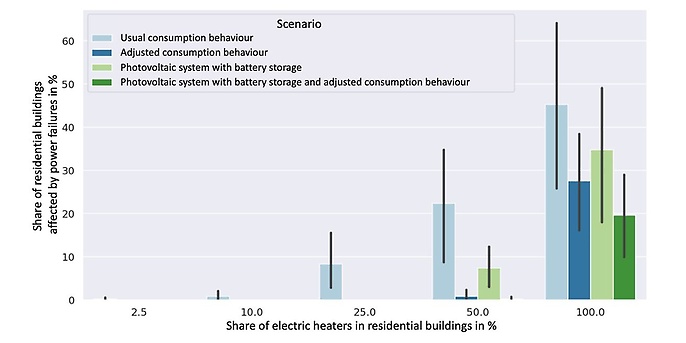1. February 2023 By Zoe Holdt, Ellen Szczepaniak and Simon Bächle
Fan heaters – is the amount of electricity they consume a risk?
Fears of a gas shortage boosted sales of fan heaters and other electric heaters last year. In the first six months of 2022 alone, around 600,000 units are estimated to have flown off the shelves in Germany, which equates to a sales increase of 35 per cent compared to the same period in the previous year. By August, this number had risen to almost one million, and in many places electric heaters had sold out completely.
The prospect of winter in particular worried many buyers, who were concerned about having to pay high gas prices or there being a gas shortage, so they wanted to be prepared for emergencies. At the same time, the media and experts warned the public about the consequences of excessively using electric heaters. There was talk of an increased risk of fire and even of a blackout – in other words, widespread power cuts.
But how exactly could a blackout occur?
Electric heaters, whether radiators or fan heaters, all work on the same principle: they convert electricity into heat. While many versions use heating conductors for this purpose, a fan heater draws in ambient air, heats it and distributes it around the room as far as possible. The benefit is that they are usually smaller than other heaters and can be easily transported from one room to the next, making them flexible to use.
A blackout is the result of the electricity grid overloading, which can be caused by a large number of electrical devices being used at the same time or other disruptions in the electricity grid. Low natural gas reserves, the phasing out of nuclear and coal-fired power and the volatile feed-in of renewable energies increase the risk of a blackout. In addition to the volatile feed-in, there is also the unpredictable use of electricity by sectors such as the electromobility industry. This causes the peak loads to become increasingly larger and more unpredictable towards the end of the working day. Although fan heaters consume a low amount of electricity compared to electric cars, there was a fear that the devices could unexpectedly drive up the load peaks just mentioned and thus destabilise the electricity grid. In an interview on concerns about power cuts caused by fan heaters, the President of the German Federal Network Agency (Bundesnetzagentur), Klaus Müller, said, ‘We have seen the sales figures for fan heaters, but the good thing is that they are not switched on. People are putting them in the cellar.’
Young researchers from the Reiner Lemoine Foundation Research Training Group also found that even large-scale use of fan heaters would have had little effect on grid stability. According to their computer-based simulations and calculations, the risk of a blackout would be less than 5 per cent, even if one in ten of the almost 19.7 million residential buildings had an electric heater in operation.

Proportion of residential buildings exposed to an increased risk of power outages, Source: Research Training Group on Energy System Change of the Reiner Lemoine Foundation
Is using electric heating worthwhile then?
The answer here is a hard no. Fan heaters, radiators and other electric heaters are all often more expensive to use than conventional gas heating. This is because it is not only gas that has become more expensive. Electricity has too. According to figures from the German Association of Energy and Water Industries, the price of gas as of April 2022 rose from 6 cents per kilowatt hour in the previous year to an average of 14 cents, peaking in the fourth quarter of 2022 at around 20 cents per kilowatt hour. This is an increase of over 300 per cent! In January 2023, gas became slightly cheaper again, with a kilowatt hour of natural gas currently costing about 13 cents. Meanwhile, the price of electricity rose steadily from 32 cents per kilowatt hour in 2021 to 40 cents in the second half of 2022. Currently, a kilowatt hour of electricity costs an average of 48 cents.
The average annual consumption of gas in households is about 140 to 160 kilowatt hours per square metre of living space for heating and hot water. In Germany, a flat has an average area of 90 square metres and consumes 12,600 to 14,400 kilowatt hours of natural gas. Based on this, a typical detached house with 150 square metres of living space consumes on average around 24,000 kWh of gas and would thus have to pay heating costs of €3,120 euros at the current gas prices.
Common fan heaters consume about one kilowatt per hour at the lowest setting, and this value doubles at the higher settings. For comparison: you now want to heat the same detached house using electricity instead of gas. To do this, you set up four fan heaters throughout the house and consume 15,330 kilowatt hours of electricity per year with average heating behaviour. Assuming that the heating season lasts from October to April, you have the heating on for 14 hours per day and the four fan heaters have an average output of 1,500 watts each, at the current electricity prices, this will cost you €7,350 – not including hot water.
What can we learn from this?
Heating with electricity instead of with gas therefore entails significantly higher costs and also involves a significantly higher risk of burns and fire. This means it is better to turn on the heating only when you need it and thus conserve resources rather than to use electric heaters.
You will find more exciting topics from the adesso world in our latest blog posts.
Why not check out some of our other interesting blog posts?



